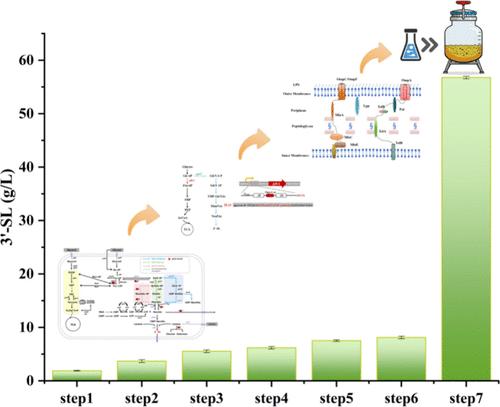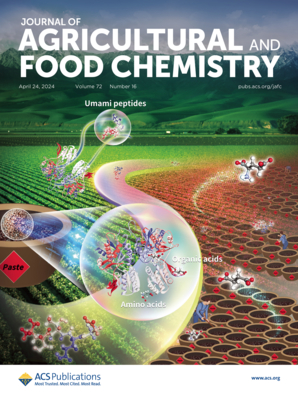利用大肠杆菌高效生产 3′-半乳糖
IF 5.7
1区 农林科学
Q1 AGRICULTURE, MULTIDISCIPLINARY
引用次数: 0
摘要
3′-Sialyllactose (3′-SL)是母乳低聚糖的关键成分,具有显著的保健作用和免疫调节功能,越来越多地被用于婴儿配方奶粉和膳食补充剂中。本研究提出了一种利用大肠杆菌 BL21star(DE3)ΔlacZ 通过基因组整合高效生物合成 3′-SL 的新方法。我们首先通过删除参与降解 N-乙酰神经氨酸的关键基因 nanA、nanK、nanE 和 nanT 来解决代谢竞争问题。这种策略性基因敲除将竞争途径的通量降至最低。改造后的大肠杆菌菌株随后转化了外源基因 neuBCA 和 nST,从而能够从头合成 3′-SL。利用模块化代谢工程策略优化了 MSU 模块中关键酶的表达,加强并平衡了碳通量的分布。此外,还实施了辅助因子再生策略,以提高 CTP 的可用性,从而改善辅助因子的循环,并对代谢途径进行微调,以最大限度地生产 3′-SL。为了进一步提高 3′-SL 的胞外浓度,还对转运蛋白进行了筛选,结果在 5 升生物反应器发酵过程中,产量达到了前所未有的 56.8 克/升,为该领域树立了新的标杆。本文章由计算机程序翻译,如有差异,请以英文原文为准。

Efficient Production of 3′-Sialyllactose Using Escherichia coli
3′-Sialyllactose (3′-SL), a key component of human milk oligosaccharides, provides significant health benefits and immune modulation, and is increasingly used in infant formula and dietary supplements. This study presents a novel approach for the efficient biosynthesis of 3′-SL using Escherichia coli BL21star(DE3)ΔlacZ through genomic integration. We first addressed the issue of metabolic competition by deleting crucial genes, nanA, nanK, nanE, and nanT, that are involved in the degradation of N-acetylneuraminic acid. This strategic gene knockout minimized the flux through competing pathways. The engineered Escherichia coli strain was subsequently transformed with the exogenous genes neuBCA and nST, enabling the de novo synthesis of 3′-SL. A modular metabolic engineering strategy was utilized to optimize the expression of key enzymes within the MSU module, enhancing and balancing the carbon flux distribution. Additionally, a cofactor regeneration strategy was implemented to increase CTP availability, which improved cofactor recycling and fine-tuned the metabolic pathway for maximal 3′-SL production. Transport protein screening was incorporated to further increase the extracellular concentration of 3′-SL, resulting in an unprecedented yield of 56.8 g/L in a 5L bioreactor fermentation, setting a new benchmark in the field.
求助全文
通过发布文献求助,成功后即可免费获取论文全文。
去求助
来源期刊
CiteScore
9.90
自引率
8.20%
发文量
1375
审稿时长
2.3 months
期刊介绍:
The Journal of Agricultural and Food Chemistry publishes high-quality, cutting edge original research representing complete studies and research advances dealing with the chemistry and biochemistry of agriculture and food. The Journal also encourages papers with chemistry and/or biochemistry as a major component combined with biological/sensory/nutritional/toxicological evaluation related to agriculture and/or food.

 求助内容:
求助内容: 应助结果提醒方式:
应助结果提醒方式:


